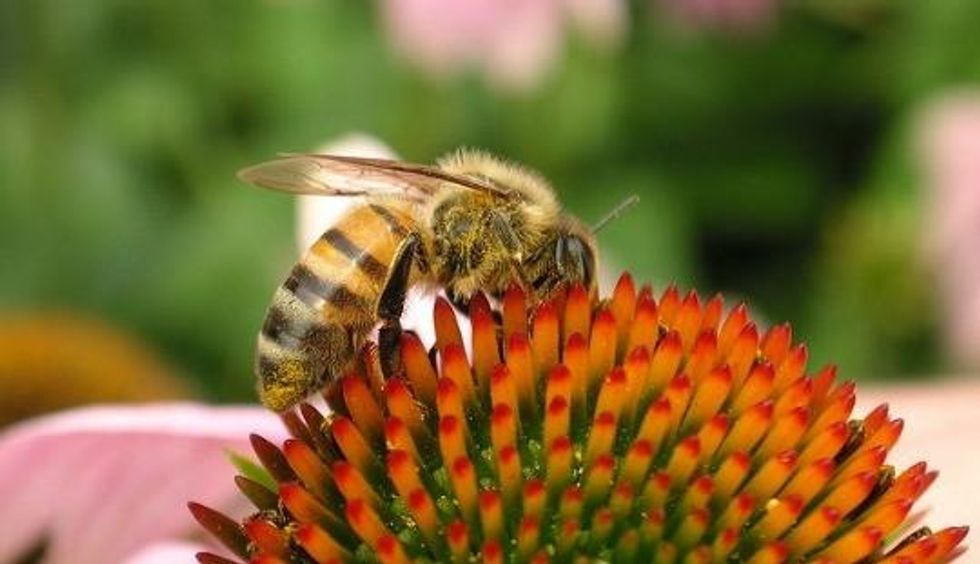Regulators are ignoring evidence that the world's most used pesticide is killing bees and other insects, Members of Parliament in the UK say.
The Guardian's Damian Carrington reported Wednesday on findings from an inquiry by the Parliament's Environmental Audit Committee (EAC) that scrutinized the pesticide, and wrote that MPs are "accusing regulators of 'turning a blind eye' to the risk for bees."
The questions surround the Bayer-made imidacloprid, a systemic insecticide and neonicotinoid, a kind of pesticide that has been implicated in many studies to a decline in bees and other pollinators.
Carrington reports:
"European regulators seem to have turned a blind eye to data on the danger that one of the world's biggest selling pesticides could pose to bees and other pollinators," said Joan Walley MP, chair of the Environmental Audit Committee (EAC). "Evidence seen by the committee raises serious questions about the integrity, transparency and effectiveness of EU pesticides regulation. Data available in the regulators' own assessment report shows it could be 10 times more persistent in soils than the European safety limit." [...]
The European Food Safety Authority (EFSA), which assesses the risks of pesticides accepted earlier in 2012 that current "simplistic" regulations contain "major weaknesses". But the UK government has failed to follow countries including France, Germany, Italy and Slovenia in suspending the use of some neonicotinoids, although it has accelerated its research on the issue. [...]
Even the National Farmers Union (NFU), which argues that there is no need for a change of approach to neonicitinoids, told MPs: "It is very well known that the current pesticide risk assessment systems for bees were not developed to assess systemic pesticides."
Soil Association, a UK group that campaigns for healthy food and farm systems and whose Keep Britain Buzzing campaign is working to ban neonicitinoids, presented evidence to MPs at the inquiry in November. The group told the inquiry:
- The UK Government is ignoring the strong and quickly growing body of scientific evidence which points to the damaging impact of neonicotinoid pesticides on pollinating insects, including bumblebees and honey bees.
- Defra [Department for Environment, Food and Rural Affairs] has made commitments to put in place new research to explore further the impacts of neonicotinoids on bumblebees, and have acknowledged that the risks of pesticides to bees needs to be updated, but these plans ignore the weight of existing evidence, and will delay the action that the Government should take now.
- Scientists have established that very, very small doses of neonicotinoids, well below what European governments consider a 'safe' level of toxic chemical, can disrupt bee behaviour in ways likely to contribute to the collapse in numbers of honeybees, bumble bees and other pollinating insects.
- The European Food Standards Agency has admitted that neonicotinoid and other systemic insecticides have not been properly evaluated ever since their introduction and use of some neonicotinoids has been either banned or suspended in the USA, Germany and France. Italy banned neonicotinoid insecticide use on maize and this led to a halving of winter honey bees deaths over three years.
- Banning neonicotinoid pesticides need not adversely affect farmers' profits as Italian government research showed.
- UK and EU pesticide safety testing is not of an acceptable standard. First, it relies not on science but on industry data, which is not subject to scientific peer-review and publication. Second, there is no requirement for companies to publish all the research they conduct, with the risk that cherry-picked, favourable studies are used to obtain regulatory approval. Third, no safety testing which looks at the impact of repeated, very low doses (below accepted 'safe' levels) of pesticide are required. Fourth, little or no research is done on the impact of likely combinations of pesticides (the cocktail effect) that insects like honey bees and other insects will actually encounter on farms.
Environmental group Buglife, which works for the conservation of all invertebrates, also offered testimony highlighting the dangers of inaction on neonicitinoids
"The use of these indiscriminate pesticides must be suspended before it is too late to halt the alarming decline in wild pollinators," said Buglife CEO Matt Shardlow. "Italy, Germany, France and Serbia are among the nations to have already suspended the use of these killers. It is time the Government realised that the public have no wish for the UK to be considered the dirty old man of Europe."
Despite the statements and studies outlining the risks of the accumulation of the pesticide in the soil to pollinators, environment minister Lord De Mauley's comments on Wednesday to the EAC offer little hope of change.
"The advice to government has been and remains that there are no unacceptable effects. If new work gives rise to a change in advice, we will take it," the Guardian reports De Mauley as saying. "At the moment, I am satisfied that [European regulatory system] is working properly."
* * *
Watch Buglife CEO Matt Shardlow give evidence to the House of Commons Environmental Audit Committee on insects and insecticides by clicking on the link Parliamentlive.tv



